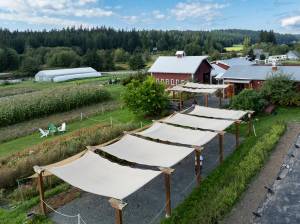Green chilies: where to get them, locally grown
Published 11:17 pm Sunday, August 31, 2008
All Scott Honold wanted was some decent green chilies.
He lived in southern Colorado, where it’s not uncommon to eat green chili sauce at all three meals.
There, people buy gunnysacks full of chilies, he said. Purveyors set up industrial roasters outside supermarkets. And the smell of chilies roasting is as familiar and welcome as the aroma from a decent cup of coffee.
What a disappointment, then, when he moved to the Northwest in 1989 and found only a few shriveled Anaheims in the supermarket.
He and wife Bonnie tried ordering green chilies through the mail. When the cost of 25 pounds of chilies topped $140, they started growing their own at their Monroe home. In August the couple changed from being home gardeners to commercial growers and began offering their green chilies for sale at the Everett Farmers Market under the name Three Bros. Farms. They plan to be at the market Sept. 7 and 21.
They sell a hot green chili called Barker, a medium-hot Big Jim and the mild Anaheim. This season, the family expects to sell 1,000 pounds of green chilies.
“We are a very small grower,” Scott Honold said. “For us it’s not about the money, but sharing the love of green chilies.”
This is the family’s first tentative step running their own business, and it is a family affair. The couple’s three sons — Cole, 12, Mason, 9, and Nate, 6 — help with growing, harvesting and selling the peppers.
At the market, the family scoops peppers into paper sacks for customers. A large sack costs $5, a small one $3. The boys are paid $12 per market day plus a dollar commission on each sale.
Cole said it usually takes some customer education to make a sale.
“You have to explain a lot of stuff,” he said. “I like it. It’s pretty fun.”
Scott Honold was pleasantly surprised when many customers seemed to get green chilies. The family made their first sale before the market officially opened. One customer even recognized that the Honolds spell “chili” the way they do in the Southwest: chile.
“One lady stopped and smelled and said, ‘Ah, thank you,’ ” Honold said, mimicking the way the woman grabbed a fresh pepper and held it to her nose.
The venture started six months ago, when the family laid an electric blanket on the living room pool table and started 500 tiny pepper plants from seed. Honold had grown confident growing peppers for the family for a decade — he had never lost a plant — but he had the misfortune to start during an unusually cold and wet spring.
When he decided to get a jump on the season by putting out the seedlings two weeks early, the weather took a nasty toll on the crop, killing about a fifth. The others pouted in the ground, their growth retarded by the cold.
“Yeah, we made quite a few mistakes,” he said.
It’s a misconception that hot peppers can’t grow here, he said. It is more difficult to grow peppers here than in hotter, drier climates, but there are varieties that perform. The family extends the growing season by using homemade hoop houses that have to be pulled closed at night and open again in the morning.
Despite setbacks, the family plowed ahead. They planted new seedlings, and they babied the survivors. And the Honolds planned for their debut at the farmers market. They applied for licenses from the city and state, and they applied for a spot at the Everett Farmer’s Market, a private business that uses leased land on the Everett waterfront.
Inger Hutton, a manager and owner of the market, said she looks for vendors who offer something different. Several vendors already offer green chilies, but what appealed to her about the Honold family was the idea of roasting them on site. She was disappointed when the family didn’t secure the food permit necessary to sell roasted peppers.
If other people want to follow the Honolds’ path, she suggested offering a unique product, such as mushrooms. The market has a liquor license, and she said she’d welcome a local hard cider, wine or beer.
She said the most successful vendors at her market have excellent rapport with customers. The best produce vendors usually have recipes or ideas ready for customers who may not know how to cook a squash blossom.
The Honolds would need to grow more varieties and get the roaster running, she said.
That’s the plan for next season, Scott Honold said. The family also plans to triple the number of plants they grow. Honold said a typical pepper plant produces about 5 pounds of chilies. They hope to break even next year.
Despite putting hours into peppers on top of the couple’s full-time jobs, the family didn’t make a profit, partly because they had to invest hundreds of dollars in equipment. That doesn’t bother Honold. He said his sons are learning responsibility and customer service skills. There is a strong demand for the product and the chilies are selling well.
Plus, Honold said he’s introduced the Northwest to a tradition his family loves. Honold said roasted peppers are a great comfort food, one his family equates with later summer and football. A few roasted peppers on the barbecue could be a new tradition in the Northwest.
“We feel proud,” he said. “We’ve accomplished something.”
Reporter Debra Smith: 425-339-3197 or dsmith@heraldnet.com.
Three Bros. Farms offers its customers this recipe for green chile sauce:
3 tbsp. olive oil
1 small onion
1 cup green chilies, chopped
2 tbsp. flour
1 clove of garlic, chopped
1/2 tsp. salt
1/4 tsp. ground black pepper
1 cup broth (chicken, vegetarian or beef)
Saute onions and garlic in 2 tablespoons olive oil for several minutes. Add green chiles and saute another 2 minutes. In a small bowl, mix flour, salt and pepper. Add 1 tablespoon oil to create a paste slightly thicker than heavy cream. Add the paste to the sauteed chilies and onions and heat. Add broth, stirring constantly to avoid lumps. Bring to a boil, then reduce heat and simmer 10 minutes. Add more broth to create desired consistency.




